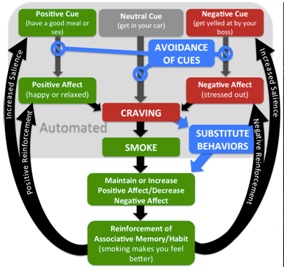During my residency training, one of my professors told a story of a patient who had gone into a residential treatment community for heroin addiction. The patient stayed there for 18 months and during that stay didn't have many cravings. But on the day of his discharge, he left the facility, got on the train, and immediately called his old dealer to score some heroin because he was craving so much.
What happened?
Alcoholics Anonymous has a saying: "people, places and things." As in, if you want to stay sober, you should avoid all of these. This makes sense. If you have associated certain people, particular places or things with drinking or using drugs, every time you come in contact with them (or even just thinking about them) can spark a craving. Remember that habit loop I talked about in the second blog post? So if someone associates drinking with a certain bar (or bars in general), it makes good sense to avoid these places. If someone has always shot up with a particular person, it makes perfect sense to avoid that person. And if someone associates Alcoholics Anonymous with being sober, then darn right, going to meetings is going to help. These are healthy substitution strategies.
Can we use the same strategies for smoking?
Can we avoid people, places and things that we've associated with cigarettes? If you only smoke in certain social situations, this might work. But if you are a pack-a-day smoker, and you can guess where I'm going with this, it might be hard to start avoiding your car, your house (even if it is only the back porch), the smoker's post outside your office, and all of the other places that you've come to associate with smoking. And even if you could, avoiding them for a short period of time may not actually dismantle the addictive loop. As you can see from the diagram below, this loop (black arrows) doesn't actually get dismantled when you avoid triggers (blue), or use substitution behaviors (blue)1.

This may be why that 18 month residential stay didn't work for the patient I mentioned above. The triggers weren't there, but the loop was still intact. Or his brain knew that craving was a waste of time because he wouldn't have access to drugs.
So being dropped on a deserted island may help you quit, but you may have to be ready to stay there ... permanently.
References
1.Brewer, J.A., H.M. Elwafi, and J.H. Davis, Craving to Quit: Psychological Models and Neurobiological Mechanisms of Mindfulness Training as Treatment for Addictions. Psychol Addict Behav, 2012: p. No Pagination Specified. PMCID: 3434285.
For more by Dr. Judson Brewer, click here.
For more on success and motivation, click here.